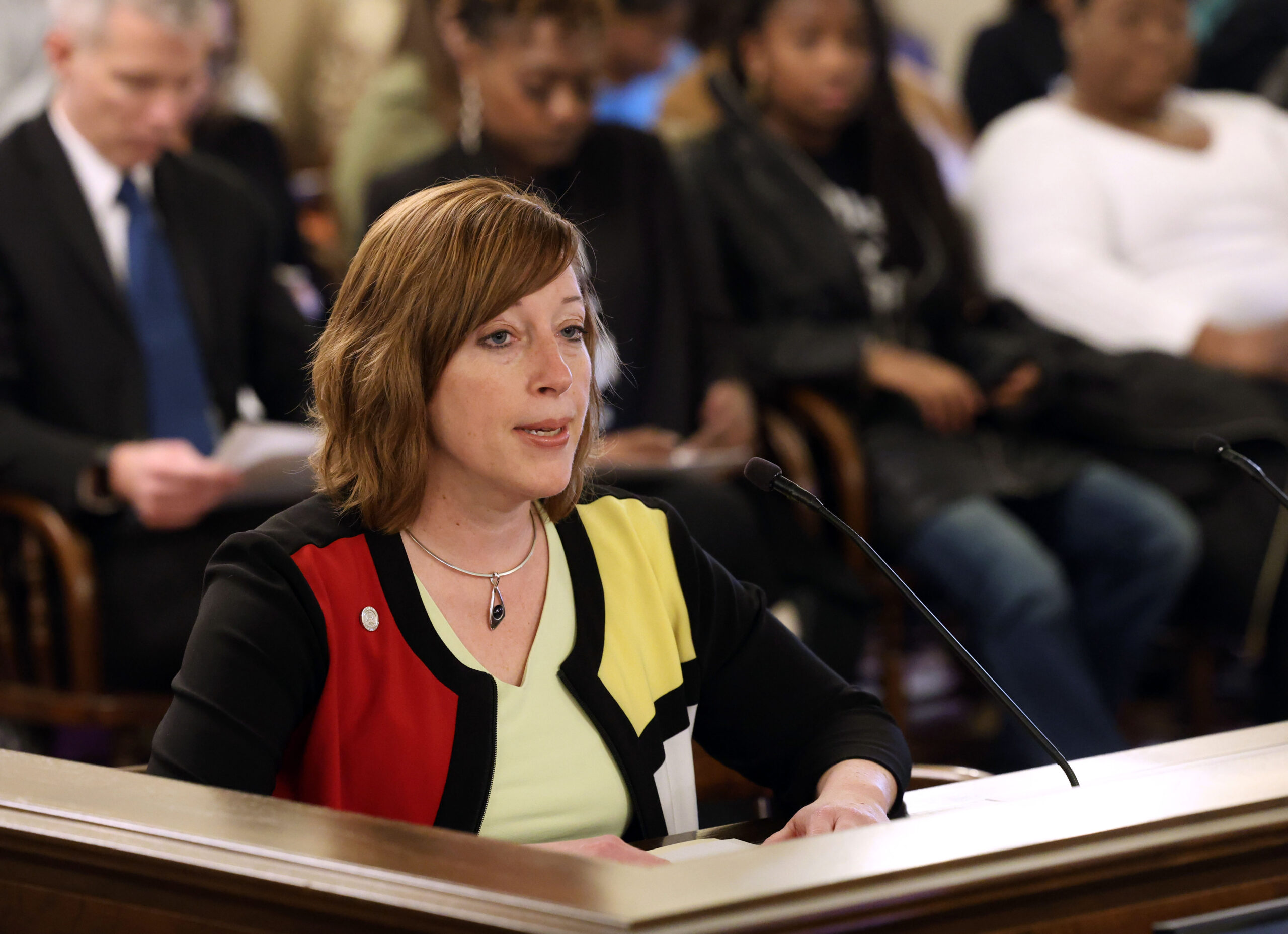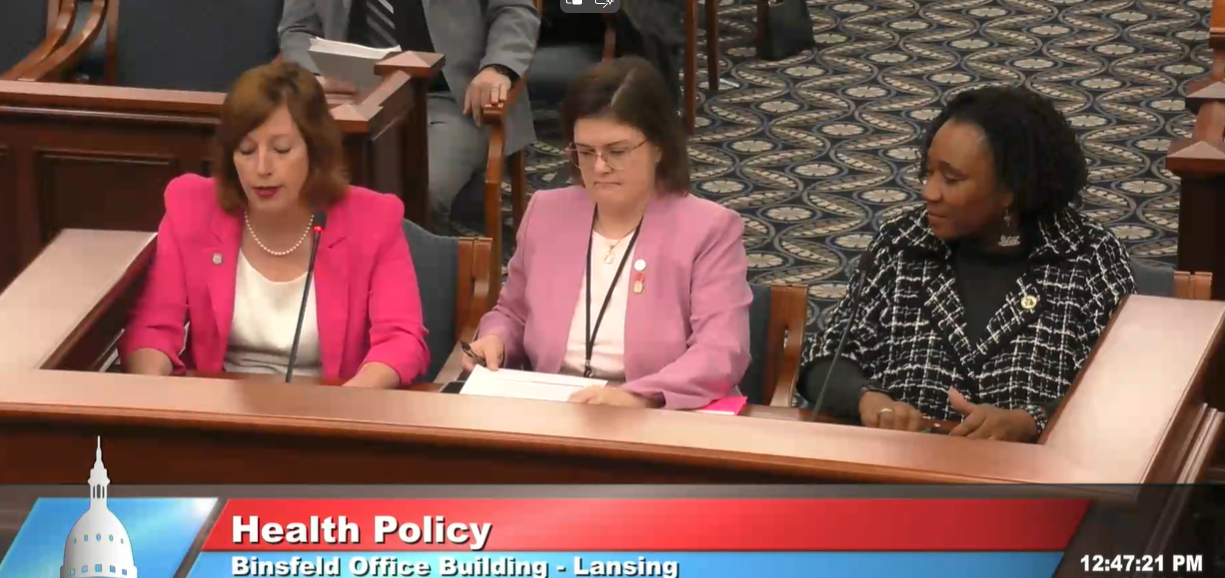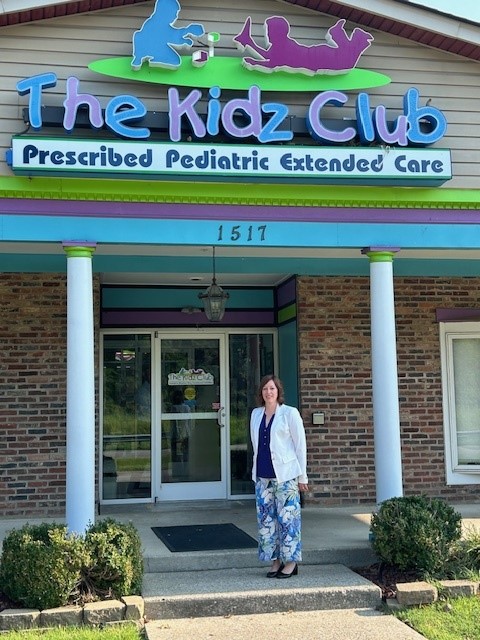In this e-newsletter:
- Legislative Social Hour
- Lame Duck Priorities Update
- Veterans’ Food Distribution Drive

Upcoming Legislative Social Hour
My next monthly legislative update will take place on Friday, December 20th, from 4:00 to 5:00 PM at Brewery Outré (567 East Ransom St, Kalamazoo).
While advanced registration is not required, those who would like to RSVP or submit questions in advance can email JulieRogers@house.mi.gov.
Updates on my Lame Duck Priorities
In the November edition of my monthly newsletter, I highlighted my Lame Duck priorities, including the Maternal Health Package, Contraception Package, Research & Development Tax Credit Package, and the Lead Poisoning Prevention Package.
“Lame duck” refers to the period between an election and the start of a new legislative term. During this time, legislators may have diminished influence and face challenges in pushing through new laws or policies, as their tenure is limited.
I am pleased to share with you that each of my Lame Duck priorities have advanced since my previous newsletter:

I am proud to share with you all that on December 11, 2024, I testified before the Senate Health Policy Committee in support of the Maternal Health Package (House Bills 4728, 5166–5173). My bill, HB 4728, removes redundant testing for Human Immunodeficiency Virus (HIV) in individuals who wish to donate breast milk to milk banks. This legislation cuts red tape and aligns Michigan with 49 other states who require only one initial test. This package aims to improve maternal and infant health outcomes and addresses maternal mortality rates, which disproportionately impact mothers of color. Following my testimony, the Maternal Health Package passed the Senate Health Policy Committee, and is now awaiting a vote by the entire Senate.

State Reps. Julie Rogers (D-Kalamazoo), Kara Hope (D-Holt) and Stephanie Young (D-Detroit) testify in the Senate Health Policy Committee.
In addition to the Maternal Health Package, I also testified in support of the Contraception Package (House Bills 5013, 5435, 5436), containing my bill, HB 5013, on December 11th. Following my testimony, the package passed the Senate Health Policy Committee, and is now awaiting a vote by the entire Senate.
This package would require insurance companies to provide a 12-month supply of contraception all at once, would allow pharmacists to write prescriptions for contraceptives, and require insurance to cover these prescriptions. The package further addresses multiple issues our residents face, such as living in a contraception desert or transportation issues faced by many living in rural areas.
On November 13th 2024, the Research and Development Tax Credit Package (House Bills 4368, 5099, 5100, 5101, 5102), containing my bill, HB 5101, passed out of the Senate. It is now waiting for Governor Whitmer’s signature.
At the time of my last newsletter, two bills — one of which was my bill, HB 5101 — were returned to the Michigan House for technical fixes. My bill specifically assists small businesses with less than 250 employees. The package has now passed with bipartisan support and is on its way to the Governor’s desk to be signed into law. Once signed, this legislation will create a state-level tax credit to encourage research and development in Michigan.
Finally, the last Lame Duck priority I shared with you, the Lead Poisoning Prevention Package (House Bills 4532, 5368, 5369), including my bill, HB 5368, was passed out of the House then sent to the Senate, on December 10, 2024.
This package would bring Michigan’s standards in line with the federal standards, revising the current threshold under state law for elevated blood lead level from 10 micrograms per deciliter to 3.5 micrograms per deciliter and improving requirements for lead abatement and mitigation for buildings and activities, such as renovation.
Updates on my Other Legislation
Though I did not name them as part of my Lame Duck priorities, several other of my bills have made progress along their legislative journey since I last updated you. These include my bills in the Health Data Utility (HBs 5283 & 5284) package, Prescribed Pediatric Extended Care (PPEC) package (HBs 5974, 6152, 6153), and my Medical Loss Ratio (HB 5825) and Brain Injury Coverage (HB 6154) bills.
Repeal Medicaid Work Requirements (HB 4224)
On December 10, 2024, I testified in support of my bill, HB 4224, in front of the Senate Committee on Housing and Human Services.
HB 4224 aims to repeal the state’s Medicaid work requirements. These requirements mandated that certain Medicaid beneficiaries work or participate in community engagement activities in order to maintain their coverage. The bill would eliminate these work requirements, restoring access to Medicaid for individuals who might otherwise lose it due to non-compliance with the work or community engagement mandates.
Occupational Therapy Licensure Compact (OT Compact) (HBs 4169–70)
On December 11th, 2024, I testified before the Senate Health Policy Committee in support of the OT Compact, containing my bill, HB 4169 in this bipartisan package.
This bill would allow occupational therapists (OTs) licensed in one compact member state to practice in others without needing additional licenses. It designates the Michigan Department of Licensing and Regulatory Affairs (LARA) to oversee participation, aiming to boost workforce mobility, improve access to care, and streamline licensing, especially in underserved areas.
The Senate Health Policy Committee passed the package unanimously, and it is now awaiting a vote by the entire Senate.
Health Data Utility (HDU) Bills (HBs 5283 and 5284)
On December 5th, 2024, the Health Data Utility Bill package, sponsored by me and Rep. Vanderwall, passed out of the House Health Policy Committee with bipartisan support. This legislation would designate a health information exchange to operate a health data utility in Michigan.
The Health Information Exchange would be a nonprofit organization responsible for managing an inclusive health IT infrastructure in the state, collecting, normalizing, and sharing health data from various sources.
The Health Data Utility, operated by this exchange, would facilitate the use of health data for treatment, care coordination, quality improvement, population health, public health emergencies, and other public health purposes.
Having passed the committee, the bill package now moves to the House floor for a vote by the full membership.

Prescribed Pediatric Extended Care (PPEC) (HBs 5974, 6152, 6153)
In the October edition of my monthly newsletter, I shared my experience visiting a PPEC site in Kentucky. As a result of that trip and extensive bipartisan collaboration, I co-sponsored the bipartisan bill package, including House Bills 5974, 6152, and 6153, with Representative Vanderwall to establish and regulate PPEC facilities in Michigan.
HB 5974 creates a licensure framework for PPEC facilities, which provide non-residential, daytime medical care for children with complex conditions, offering treatment in a supportive, social environment.
HB 6152 requires health insurers in Michigan to cover services at licensed PPEC facilities, reducing out-of-pocket costs for families.
HB 6153 requires that Michigan’s Medicaid program cover PPEC services, expanding access to care for children with complex medical needs.
On December 12, 2024, the House Health Policy Committee, which I chair, took testimony on, then successfully passed, the PPEC bill package and it now moves to the House Floor.
Medical Loss Ratios (HB 5825)
HB 5825 codifies a federal provision of the Affordable Care Act requiring health insurers to pay a minimum of 80% to health care. The bill aims to improve affordability and access to health insurance while maintaining oversight by Michigan’s Department of Insurance and Financial Services (DIFS).
On December 10, 2024, the House passed my Medical Loss Ratios bill, and it now awaits a vote in the Senate.
Veterans’ Food Distribution Drive
On Saturday, December 14th, in partnership with the Kalamazoo County Health Department, my office will host a Veteran’s Food Distribution Drive.
It will take place at the Kalamazoo County Veterans Service Office (311 East Alcott Street, Kalamazoo) from 10:00 AM to 12:00 PM. Veterans attending must show proof of veteran status to qualify for assistance.
